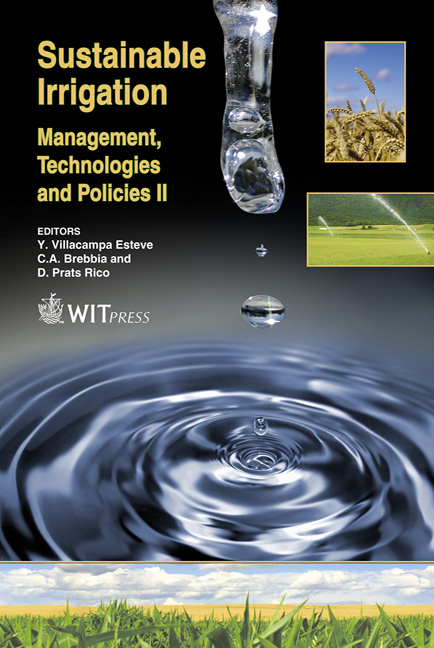Irrigation To Meet Growing Food Demand With Climate Change, Salinity And Water Trade
Price
Free (open access)
Transaction
Volume
112
Pages
10
Page Range
43 - 52
Published
2008
Size
641 kb
Paper DOI
10.2495/SI080051
Copyright
WIT Press
Author(s)
J. Connor, K. Schwabe & D. King
Abstract
There is increasing demand for water due to rising world population and wealth. This, coupled with lower supplies of freshwater due to possible climate change, suggests further stress on an already over-allocated resource. Additionally, environmental concerns relating to low flow levels, and salinity may exacerbate the ability of irrigated agricultural regions to increase agricultural production. The objective of this research is to investigate the potential impacts of climate change induced water scarcity on irrigated agricultural productivity, water demand, and profitability. The extent to which output capacity is constrained by rising salinity levels and institutional regulating water trade are evaluated for a River Murray, Australia case study. Keywords: irrigated agriculture, salinity, climate change, water scarcity. 1 Introduction Recent trends in population growth, forecasting an average of nearly a billion more people every decade, suggest commensurate increases in food production will be required to meet future global demands. While the largest increases in food demand will occur in developing countries due to increases in both populations and daily calorie intake, the agricultural lands most capable of meeting these increases are likely to be located in developed countries, particularly the United States, with a sizeable increase in exports from Australia and Eastern Europe also likely (Anderson et al. [1]). Given that the productivity of irrigated land is nearly three times greater than that of rain-fed land, significant increases in food production will most likely be met by expansion and intensification of irrigation, which currently produces over
Keywords
irrigated agriculture, salinity, climate change, water scarcity.





